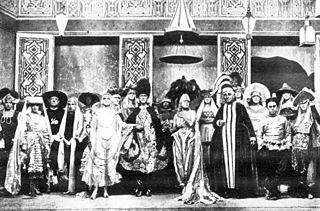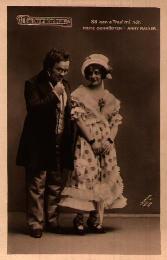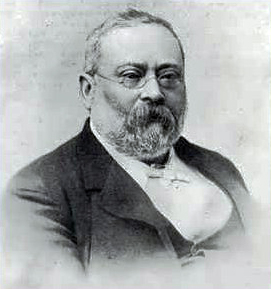Afgar, or the Andalusian Leisure is a musical with lyrics by Douglas Furber, music by Charles Cuvillier and a book by Fred Thompson and Worton David. It is based on Cuvillier's 1909 French operetta of the same name, with words by André Barde and Michel Carré.

Harry Bache Smith was a writer, lyricist and composer. The most prolific of all American stage writers, he is said to have written over 300 librettos and more than 6000 lyrics. Some of his best-known works were librettos for the composers Victor Herbert and Reginald De Koven. He also wrote the book or lyrics for several versions of the Ziegfeld Follies.

The Marriage Market is an English-language adaptation of Leányvásár, an operetta by Hungarian composer Victor Jacobi. It was adaptated by Gladys Unger, with lyrics by Arthur Anderson and Adrian Ross. The Marriage Market was the operetta's first English-language production, in 1913, at Daly's Theatre in London, starring Gertie Millar, produced by George Edwardes and directed by Edward Royce, and at the Knickerbocker Theatre on Broadway, produced by Charles Frohman, again directed by Royce, with additional songs by Jerome Kern.

Arthur Reed Ropes, better known under the pseudonym Adrian Ross, was a prolific writer of lyrics, contributing songs to more than sixty British musical comedies in the late 19th and early 20th centuries. He was the most important lyricist of the British stage during a career that spanned five decades. At a time when few shows had long runs, nineteen of his West End shows ran for over 400 performances.

Charles Cuvillier was a French composer of operetta. He won his greatest successes with the operettas La reine s'amuse and with The Lilac Domino, which became a hit in 1918 in London.
Kelville Ernest Irving was an English music director, conductor and composer, primarily remembered as a theatre musician in London between the wars, and for his key contributions to British film music as music director at Ealing Studios from the 1930s to the 1950s.

Charles Courtice Pounds, better known by the stage name Courtice Pounds, was an English singer and actor known for his performances in the tenor roles of the Savoy Operas with the D'Oyly Carte Opera Company and his later roles in Shakespeare plays and Edwardian musical comedies.

Basil Willett Charles Hood was a British dramatist and lyricist, perhaps best known for writing the libretti of half a dozen Savoy Operas and for his English adaptations of operettas, including The Merry Widow.

Das Dreimäderlhaus, adapted into English-language versions as Blossom Time and Lilac Time, is a Viennese pastiche operetta with music by Franz Schubert, rearranged by Heinrich Berté (1857–1924), and a libretto by Alfred Maria Willner and Heinz Reichert. The work gives a fictionalized account of Schubert's romantic life, and the story was adapted from the 1912 novel Schwammerl by Rudolf Hans Bartsch (1873–1952). Originally the score was mostly Berté, with just one piece of Schubert's, but the producers required Berté to discard his score and create a pasticcio of Schubert music.

Les p'tites Michu is an opérette in three acts, with music by André Messager and words by Albert Vanloo and Georges Duval. The piece is set in Paris in the years following the French Revolution and depicts the complications ensuing after the identities of two girls become confused in their infancy.

Wilhelm Meyer Lutz was a German-born British composer and conductor who is best known for light music, musical theatre and burlesques of well-known works.

Andreas Dippel was a German-born operatic tenor and impresario who from 1908 to 1910 was the joint manager of the New York Metropolitan Opera.

La Basoche is an opéra comique in three acts, with music by André Messager and words by Albert Carré. The opera is set in Paris in 1514 and depicts the complications that arise when the elected "king" of the student guild, the Basoche, is mistaken for King Louis XII of France.

Henri Charles Antoine Gaston Serpette was a French composer, best known for his operettas. After winning the prestigious Prix de Rome as a student at the Paris Conservatoire, he was expected to pursue a career in serious music. Instead, he turned to operetta, writing more than twenty full-length pieces between 1874 and 1900. He accepted some conducting work and also served as a critic and journalist for a number of French newspapers and magazines.

Francis Chassaigne was a Belgian-born French composer of operettas, songs, and numerous pieces of dance music for piano. The English-language versions of his operettas, Le droit d'aînesse (1883) and Les noces improvisées (1886) became very popular in Britain and the United States. Chassaigne was married to the Swiss-born operetta singer Louise Roland.

Josef Zygmunt Szulc was a composer and conductor. He also used the pseudonym Jan Sulima.
Maurice Yvain was a French composer noted for his operettas of the 1920s and 1930s. Some of which were written for Mistinguett, at one time the best-paid female entertainer in the world. In the 1930s and 1940s, he became a major success in the United States and several of his pieces appeared in the famous Ziegfeld Follies on Broadway. He also composed music for several films of notable directors such as Anatole Litvak, Julien Duvivier, and Henri-Georges Clouzot. Yvain's music blended with the then "spirit of Paris".

René Max Weill, who used the pseudonym Romain Coolus, was a French novelist, dramatist and film scriptwriter.

Jeanne Maubourg was a Belgian operatic mezzo-soprano. She sang with the Metropolitan Opera in New York from 1909 to 1914, taught voice in Montreal, and was heard in Canadian radio dramas in the 1930s and 1940s.
Howard Ellis Carr was a British composer and conductor who also spent some of his working career in Australia. He was best known for his theatre, operetta and light orchestral genre music.

















